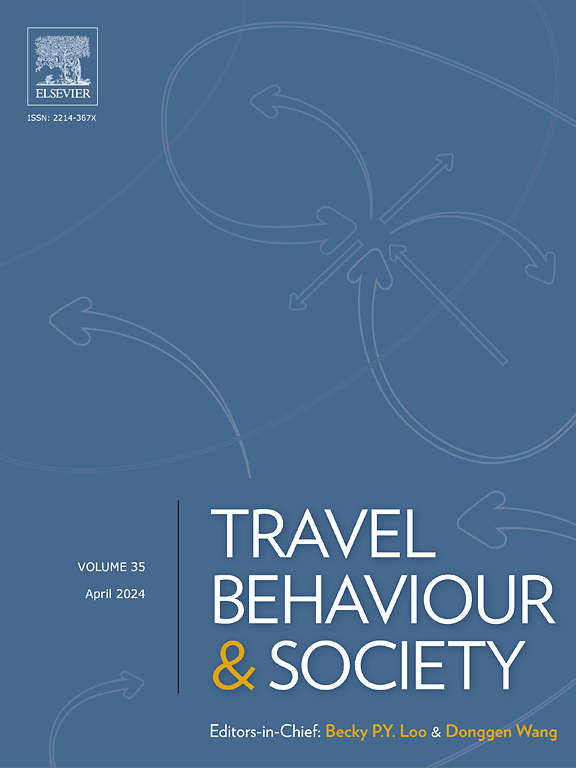使用一周应用程序使用日记的印度尼西亚城市智能手机应用程序使用对旅行影响的时间分布和上下文变化
IF 5.7
2区 工程技术
Q1 TRANSPORTATION
引用次数: 0
摘要
有证据表明,智能手机应用程序对旅行行为产生了重大影响,为不同目的和时间范围的活动参与提供了替代途径。然而,由于智能手机应用程序的独特性,它们与体育活动的组织有很大的不同。本研究旨在探讨在多日和多目的框架下,智能手机应用使用对旅行影响的时间分布和语境变化。在这项研究中,从印度尼西亚四个城市地区的1193名智能手机用户中收集了一周的应用程序使用日记,并使用障碍回归和混合logit模型进行分析。调查结果显示,个人主要是为了休闲而使用应用程序,据报道,产生新活动/旅行的影响(生成效应)是减少旅行需求(替代效应)的三倍。这表明,应用程序活动主要有助于创建新的活动。此外,较富裕的男性用户更倾向于参与产生新行程的应用活动,而在大城市或独居用户中,每日替代效应不那么普遍。应用程序活动的不同目的导致了不同背景下对活动参与的不同影响。维修活动,如网上购物,往往以多种方式影响出行,替代效应大于生成效应。时间因素,如一天中的时间和一周中的哪一天,决定了应用程序活动对旅行的影响。在中午和下午,应用程序的使用对活动-旅行模式有多重影响,在这种情况下,对现有活动的替代往往大于新活动的创造。休闲活动的替代效应最可能发生在夜间。在周末,替代效应更有可能发生在周六,因为与周日相比,周六的活动量增加了。这些发现提出了一些政策建议,以预测和管理应用程序活动对城市旅行的影响。本文章由计算机程序翻译,如有差异,请以英文原文为准。
Temporal distribution and contextual variation of the impact of smartphone app usage on travel using one-week app-use diary in Indonesian cities
Evidence shows the significant influence of smartphone apps on travel behaviour, offering alternative avenues for activity engagement across diverse purposes and timeframes. However, the organisation of activities through smartphone apps differs significantly from physical activities due to their unique nature. This study aims to explore the temporal distribution and contextual variation of the impact of smartphone app usage on travel within multi-day and multi-purpose frameworks. In this study, a one-week app-use diary was gathered from 1,193 smartphone users in four urban areas within Indonesian cities and analysed using hurdle regression and mixed-logit models. The findings reveal that individuals predominantly use apps for leisure, with the impact of generating new activities/trips (generation effects) reported three times greater than reducing travel needs (substitution effects). This indicates that app activities primarily contribute to the creation of new activities. Furthermore, wealthier and male users exhibit a higher tendency to engage in app activities that generate new trips, while daily substitution effects are less prevalent among users in larger cities or those living alone. The varied purposes of app activities result in varied impacts on activity participation across different contexts. Maintenance activities, such as online shopping, tend to influence travel in multiple ways, with substitution effects greater than generation effects. Temporal factors, such as time of day and day of the week, shape the impact of app activities on travel. At noon and in the afternoon, app usage has multiple effects on activity-travel patterns, where the substitution of existing activities tends to outweigh the creation of new ones. Substitution effects in leisure activities are most likely to occur at night. On weekends, substitution effects are more likely to occur on Saturdays due to increased activity levels compared to Sundays. These findings suggest several policy recommendations to anticipate and manage the impact of app activities on urban travel.
求助全文
通过发布文献求助,成功后即可免费获取论文全文。
去求助
来源期刊

Travel Behaviour and Society
TRANSPORTATION-
CiteScore
9.80
自引率
7.70%
发文量
109
期刊介绍:
Travel Behaviour and Society is an interdisciplinary journal publishing high-quality original papers which report leading edge research in theories, methodologies and applications concerning transportation issues and challenges which involve the social and spatial dimensions. In particular, it provides a discussion forum for major research in travel behaviour, transportation infrastructure, transportation and environmental issues, mobility and social sustainability, transportation geographic information systems (TGIS), transportation and quality of life, transportation data collection and analysis, etc.
 求助内容:
求助内容: 应助结果提醒方式:
应助结果提醒方式:


